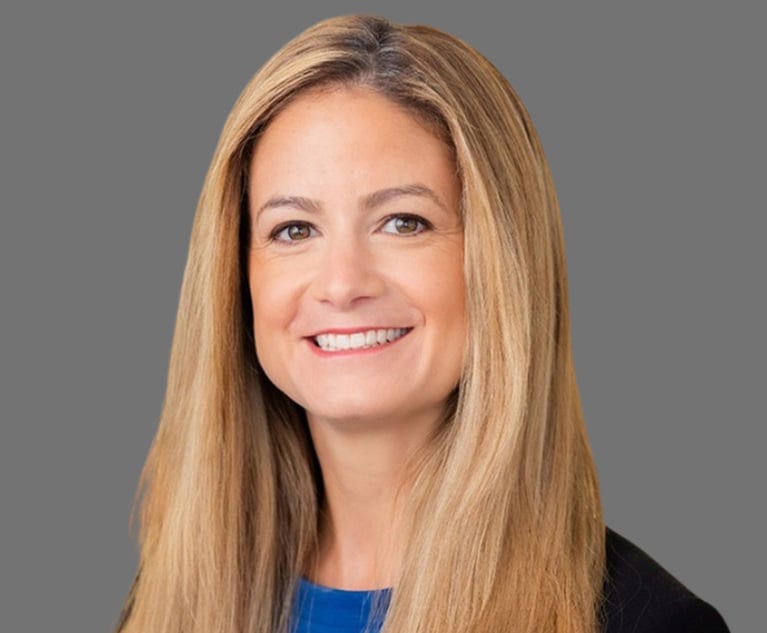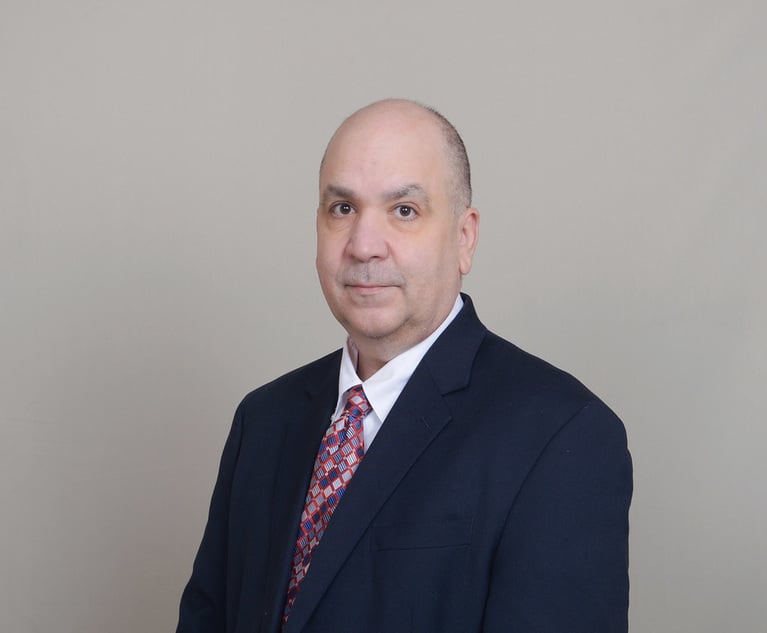Superior Court Continues to Shape Contours of Peer Review Privilege
The Pennsylvania Superior Court has waded once again into the murky waters of peer review privilege, this time laying out the requirements for a document to qualify for protection under the Patient Safety and Quality Improvement Act and clarifying the difference between a nonconfidential incident report and a peer review document covered under the Peer Review Protection Act.
April 30, 2020 at 02:07 PM
7 minute read
 Photo credit: Getty Images/iStockphoto
Photo credit: Getty Images/iStockphoto
The Pennsylvania Superior Court has waded once again into the murky waters of peer review privilege, this time laying out the requirements for a document to qualify for protection under the Patient Safety and Quality Improvement Act and clarifying the difference between a nonconfidential incident report and a peer review document covered under the Peer Review Protection Act.
In a precedential April 28 decision in Ungurian v. Beyzman, a unanimous three-judge panel of the appeals court affirmed the order of a Luzerne County trial judge compelling defendant Wilkes-Barre General Hospital to produce several documents in a medical malpractice case it claimed were privileged.
Plaintiff Susan Ungurian, suing Wilkes-Barre General over the incapacity of her son following a cystoscopy procedure at the hospital, sought several documents: an event report completed March 5, 2018, by certified registered nurse anesthetist Robert Burry; the SSER (serious safety event rating) meeting summary dated April 12, 2018; minutes from the Patient Safety Committee meeting held May 15, 2018; the root cause analysis report dated April 12, 2018; the quality improvement staff peer review completed April 15, 2018; and the unredacted credentialing files of Burry and Dr. Andrew Beyzman.
The hospital argued that the Burry event report and the root cause analysis were patient safety work product privileged by the PSQIA. The defendant also argued that the PRPA privilege covered the Burry event report and the root cause analysis, as well as the quality improvement peer review meeting minutes, the SSER meeting summary, minutes from the Patient Safety Committee meeting and certain credentialing files.
The Superior Court panel—made up of Judges Alice Beck Dubow, Anne Lazarus and Victor Stabile—disagreed, however.
With regard to whether the Burry event report and root cause analysis were covered by the PSQIA, the panel said the hospital's argument fell short of what the statute requires.
"We agree with the trial court's analysis that the PSQIA requires that, in order to be considered patient safety work product, hospital had the burden of initially producing sufficient facts to show that it properly invoked the privilege," Dubow wrote in the panel's April 28 opinion. "Stated another way, hospital had to allege that it prepared the Burry event report for reporting to a [patient safety organization] and actually reported them to a PSO. Because hospital did not so allege, it did not meet its burden to establish that the Burry event report was entitled to protection under the PSQIA's patient safety work product privilege."
Turning to whether those two documents were covered under the PRPA, Dubow noted that Section 425.4 of the statute provides that "'proceedings and records of a review committee shall be held in confidence and shall not be subject to discovery or introduction into evidence in any civil action against a professional healthcare provider arising out of the matters which are the subject of evaluation and review.'"
The PRPA defines "peer review" as "the procedure for evaluation by professional health care providers of the quality and efficiency of services ordered or performed by other professional health care providers." It defines the term "professional healthcare provider" as encompassing "individuals who are approved, licensed[,] or otherwise regulated to practice or operate in the healthcare field under the laws of the commonwealth." And lastly, it defines a peer "review organization" as "any committee engaging in peer review … to gather and review information relating to the care and treatment of patients for the purposes of (i) evaluating and improving the quality of health care rendered; (ii) reducing morbidity and mortality; or (iii) establishing and enforcing guidelines designed to keep within reasonable bounds the cost of healthcare."
Dubow agreed with the trial court that the hospital's incident and event reports are business records of a hospital and not the records of a peer review committee because they're generated in accordance with the hospital's "event reporting policy."
According to Dubow, the policy states that its purpose is to prevent harm and to improve patient safety, the quality of care and health care outcomes, but makes no mention of peer review or a peer review organization or committee.
"Following our review of the record, we agree with the trial court that hospital did not generate the Burry event report during the course of peer review," Dubow said. "Instead, the report, produced in accordance with hospital's event reporting policy, is in the nature of an incident report. It is, therefore, not entitled to the confidentiality safeguards of the PRPA."
The hospital also argued that the root cause analysis was protected by the PRPA because "'the peer review was initiated by a professional healthcare provider,'" the root cause analysis committee. But that argument also failed because the hospital failed to hand over a list of the committee members, Dubow said.
"Because the PRPA privilege only applies to the observations of and materials produced during an evaluation by 'professional health care providers,' hospital's failure to identify the members of the root cause analysis committee as 'professional healthcare providers' is, as the court concluded, fatal to their privilege claim," Dubow said.
The hospital's argument that the quality improvement medical staff peer review was covered under the PRPA also failed. The hospital had argued that because the document was prepared by Dr. Dale Anderson of an organization called North American Partners in Anesthesia (NAPA), which was a named defendant.
"We agree with the trial court that, in order for the PRPA privilege to apply to the quality improvement medical staff peer review, hospital had to prove that a 'professional healthcare provider' conducted it," Dubow said. "Neither Dr. Anderson nor the NAPA defendants are 'professional healthcare providers' under the PRPA, and, as noted by the trial court, hospital did not proffer anything more than bald allegations to support its claim that Dr. Anderson performed the quality improvement medical staff peer review at its request."
The hospital also failed to prove that the SSER and patient safety committee meeting minutes were subject to PRPA confidentiality because it made nothing more than a "unilateral assertion that the meeting summary is 'privileged peer review information,'" according to Dubow.
In addition, Dubow said, the patient safety committee includes members of the community served by hospital and therefore is not exclusively composed of "'professional healthcare providers.'"
Finally, Dubow found that Ungurian was also entitled to the unredacted credentialing files of Burry and Beyzman because the state Supreme Court ruled in the 2018 case Reginelli v. Boggs that credentialing review is not protected by the PRPA.
The ruling in Ungurian comes less than three months after a different three-judge Superior Court panel (also led by Dubow) asked the state Supreme Court in a separate case to clarify Reginelli's holding with regard to credentialing records.
In Leadbitter v. Keystone Anesthesia Consultants, the Superior Court sought guidance on how to handle situations in which credentialing records are generated by peer review committees.
"In light of the fact that the Supreme Court assumed that documents in a credentialing file are not peer review documents and in this case, the documents at issue are peer review documents, it would be helpful for the Supreme Court to grant allocatur and address this issue directly," Dubow said in Leadbitter.
A petition for allowance of appeal in that case in currently pending before the Supreme Court.
Joseph Quinn Jr. of Hourigan, Kluger & Quinn in Kingston represents Ungurian. Ira Podheiser of Burns White in Pittsburgh represents the defendants. Neither could be reached for comment.
This content has been archived. It is available through our partners, LexisNexis® and Bloomberg Law.
To view this content, please continue to their sites.
Not a Lexis Subscriber?
Subscribe Now
Not a Bloomberg Law Subscriber?
Subscribe Now
NOT FOR REPRINT
© 2025 ALM Global, LLC, All Rights Reserved. Request academic re-use from www.copyright.com. All other uses, submit a request to [email protected]. For more information visit Asset & Logo Licensing.
You Might Like
View All

JCPenney Customer's Slip-and-Fall From Bodily Substance Suit Best Left for a Jury to Decide, Judge Rules
4 minute read
People in the News—Jan. 9, 2025—Rawle & Henderson, Armstrong Teasdale
3 minute read
Law Firms Mentioned
Trending Stories
- 1'It's Not Going to Be Pretty': PayPal, Capital One Face Novel Class Actions Over 'Poaching' Commissions Owed Influencers
- 211th Circuit Rejects Trump's Emergency Request as DOJ Prepares to Release Special Counsel's Final Report
- 3Supreme Court Takes Up Challenge to ACA Task Force
- 4'Tragedy of Unspeakable Proportions:' Could Edison, DWP, Face Lawsuits Over LA Wildfires?
- 5Meta Pulls Plug on DEI Programs
Who Got The Work
Michael G. Bongiorno, Andrew Scott Dulberg and Elizabeth E. Driscoll from Wilmer Cutler Pickering Hale and Dorr have stepped in to represent Symbotic Inc., an A.I.-enabled technology platform that focuses on increasing supply chain efficiency, and other defendants in a pending shareholder derivative lawsuit. The case, filed Oct. 2 in Massachusetts District Court by the Brown Law Firm on behalf of Stephen Austen, accuses certain officers and directors of misleading investors in regard to Symbotic's potential for margin growth by failing to disclose that the company was not equipped to timely deploy its systems or manage expenses through project delays. The case, assigned to U.S. District Judge Nathaniel M. Gorton, is 1:24-cv-12522, Austen v. Cohen et al.
Who Got The Work
Edmund Polubinski and Marie Killmond of Davis Polk & Wardwell have entered appearances for data platform software development company MongoDB and other defendants in a pending shareholder derivative lawsuit. The action, filed Oct. 7 in New York Southern District Court by the Brown Law Firm, accuses the company's directors and/or officers of falsely expressing confidence in the company’s restructuring of its sales incentive plan and downplaying the severity of decreases in its upfront commitments. The case is 1:24-cv-07594, Roy v. Ittycheria et al.
Who Got The Work
Amy O. Bruchs and Kurt F. Ellison of Michael Best & Friedrich have entered appearances for Epic Systems Corp. in a pending employment discrimination lawsuit. The suit was filed Sept. 7 in Wisconsin Western District Court by Levine Eisberner LLC and Siri & Glimstad on behalf of a project manager who claims that he was wrongfully terminated after applying for a religious exemption to the defendant's COVID-19 vaccine mandate. The case, assigned to U.S. Magistrate Judge Anita Marie Boor, is 3:24-cv-00630, Secker, Nathan v. Epic Systems Corporation.
Who Got The Work
David X. Sullivan, Thomas J. Finn and Gregory A. Hall from McCarter & English have entered appearances for Sunrun Installation Services in a pending civil rights lawsuit. The complaint was filed Sept. 4 in Connecticut District Court by attorney Robert M. Berke on behalf of former employee George Edward Steins, who was arrested and charged with employing an unregistered home improvement salesperson. The complaint alleges that had Sunrun informed the Connecticut Department of Consumer Protection that the plaintiff's employment had ended in 2017 and that he no longer held Sunrun's home improvement contractor license, he would not have been hit with charges, which were dismissed in May 2024. The case, assigned to U.S. District Judge Jeffrey A. Meyer, is 3:24-cv-01423, Steins v. Sunrun, Inc. et al.
Who Got The Work
Greenberg Traurig shareholder Joshua L. Raskin has entered an appearance for boohoo.com UK Ltd. in a pending patent infringement lawsuit. The suit, filed Sept. 3 in Texas Eastern District Court by Rozier Hardt McDonough on behalf of Alto Dynamics, asserts five patents related to an online shopping platform. The case, assigned to U.S. District Judge Rodney Gilstrap, is 2:24-cv-00719, Alto Dynamics, LLC v. boohoo.com UK Limited.
Featured Firms
Law Offices of Gary Martin Hays & Associates, P.C.
(470) 294-1674
Law Offices of Mark E. Salomone
(857) 444-6468
Smith & Hassler
(713) 739-1250





